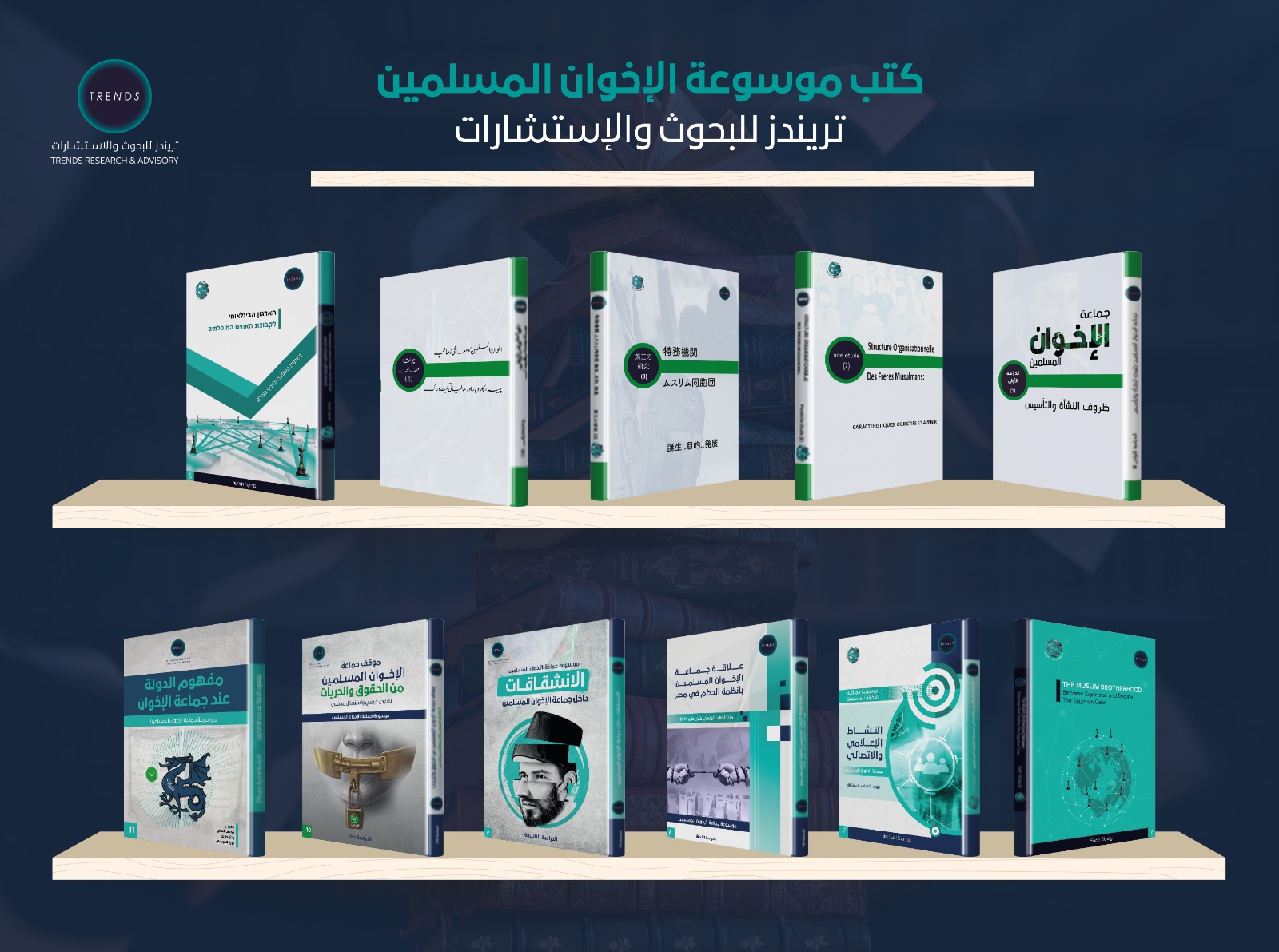Trends Research and Advisory continues to expose the false ideas, extremism and terrorism of the Muslim Brotherhood through an encyclopedia consisting of 35 books. The encyclopedic book analyzes the ideas of this group and its intellectual and political project. Eleven books have been issued so far, most of which have been translated into 15 international languages, with the aim of providing an informative document to the largest segment of readers in different countries.
The first book was entitled, “The Muslim Brotherhood.” It explored the emergence of the group, the contexts that controlled its establishment in Egypt and then traced its “intellectual-heritage” and “contemporary origins.” The book covered the personal characteristics of its most prominent leaders. The analysis addressed the impact of certain variables at multiple levels that shaped the group’s ideas, and their relevance to its religious and political project. The second book is entitled: “The Organizational Structure of the Muslim Brotherhood: Features and objectives”. This one Monitored the evolution of the organizational and administrative structure of the group from a comprehensive perspective that takes into account the social, economic and political context in which the Group originated, and how this was reflected in its administrative units.
The third book, entitled “The Special System of the Muslim Brotherhood”, reviewed the intellectual writings that paved the ground for the emergence of this system, and the internal and external context that the group employed to justify its establishment. The fourth book, entitled “The Economic Construction of the Muslim Brotherhood: Financial, Business and Finance Networks”, dealt with the group’s economic activity and how it obtained the necessary funding to carry out its various activities.
The fifth book, The International Organization of the Muslim Brotherhood: Networks of impact and Influence in the World, reveals the Brotherhood’s core goal of achieving the “hegemony over the whole world, ” by expanding in Arab and Islamic countries and infiltrating Western societies. The group is advocating the Islamization of these societies. For that purpose, it employs diverse tools developed by its international organization in order to achieve its goals. The sixth book, was entitled “The Muslim Brotherhood between Expansion and Decline: The Egyptian Case,” reviewed the expansion and decline of the group in Egypt since its establishment in 1928 until its ouster from power in 2013.
The seventh book, entitled: “The Media and Communication Activity of the Muslim Brotherhood… Vision, Goals and Future Prospects.” This book covers the media and communication activity of the group by monitoring the intellectual foundations of its media discourse, and reviewing the development of the Brotherhood media network, which began with traditional means, and transformed to digital media. The eighth book, entitled “The Muslim Brotherhood’s Relationship with the Regimes in Egypt”, sheds light on the nature of the relationship between the Brotherhood and the successive regimes that ruled the Egyptian state from the monarchy until last year. It revealed the features of this relationship and the tools used by the group to manage this relationship.
The ninth book was entitled “Splits within the Muslim Brotherhood”, which deals with the presentation and analysis of the divisions that occurred within the group since its inception in 1928 until the recent crisis of defections that divided the group into more than one faction, scattered between London, Istanbul and Egypt. The tenth book, entitled ““The Muslim Brotherhood Attitude towards political rights and freedoms: Conflict of values and exploitation for the sake of narrow interests.” The Book highlights the fact that the group views on some public rights and freedoms, such as political participation, peaceful transfer of power, freedom of expression, scientific research and freedom of belief, in addition to civil society institutions and women.
The eleventh book of the Muslim Brotherhood Encyclopedia, entitled “The Brotherhood’s Concept of the State”, asserts that the Muslim Brotherhood has been hostile to the Arab nation-state since its inception. In fact, the group considered it a stumbling block on its way to power. The Brotherhood then stood against the modernist foundations and principles of the modern state, stood against the religious foundations of the modern as opposed to religious conceptions of the group.
Confrontation with thought and scientific research
Dr. Mohammed Abdullah Al-Ali, CEO of Trends Research and Advisory, stressed that the publication of these 11 books of the Muslim Brotherhood Encyclopedia that he undertakes is a result of his keenness to lay the foundations for a global dialogue on the ideology of the Muslim Brotherhood, its doctrine, main orientations, and its relationship with transnational extremist organizations that adopt the same ideas. The objective here is to iexpose the dangers of this ideology and its goals that seek to undermine the stability of countries. He added that these books explain and refute the intellectual and political project adopted by the Muslim Brotherhood, and explain its dangerous plots against countries and societies. The series highlight the various domestic, regional and international contexts, and foresees their future consequences. In conclusion, Dr. Al-Ali stressed that confronting extremist ideology is not limited to the security aspect, but includes other aspects, the most important of which is the intellectual, research and cultural aspects, which is the role that Trends is keen to play.



